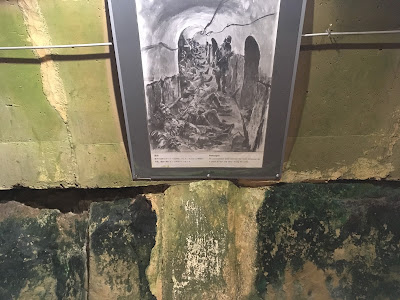An Honorable Suicide - Exploring the tunnels of the Former Japanese Navy Underground Bunker in Okinawa
 |
| Pathway to the abyss.... |
"Even if my body perishes in Okinawa, the noble Japanese spirit within my soul shall defend Japan forever."
-Rear Admiral Minoru Ota, Imperial Japanese Navy
The combined sound of steel, and limbs hitting concrete walls filled the air as their bodies were ripped apart instantaneously. Their defeat was inevitable as American Navy attacks on Okinawan shores increased and supplies waned thin.The stiffness of the cold air deep inside the Former Japanese Underground Navy Headquarters in Okinawa is almost more unbearable than the dense humidity above ground on the island. Rear Admiral Minoru Ota, Commanding Officer of the Former Japanese Imperial Navy, committed suicide in this underground tunnel on June 13, 1945. Four other Japanese commanders followed suit. The damp, cool hallways offer a somber reminder; thousands of people died here.
 |
| The sign reads, "Wall riddled with a hand-grenade when committed suicide." |
As many as 5,000 Japanese soldiers were reported to have died in the tunnel by suicide, explosions, or gas attacks. These attacks were part of the U.S. "Umanori Operation" which involved drilling holes in Japanese Navy tunnels and injecting poisonous gas and explosives near the entrance. This prevented the Imperial troops from escaping. The operation began on June 6, 1945, 7 days prior to Ota's suicide. On June 11, the U.S. launched a full scale attack on Okinawa which obliterated the Imperial Japanese Navy.
    |
| Inside the Former Navy Underground Headquarters. A pickaxe that was used by Okinawans and Imperial Japanese Navy troops to dig the tunnel is on display. |
 |
Ota's poem in the room he committed suicide in. "How could we rejoice over our birth, but to die an honorable death under the Emperor's flag" |
Ota's hatred for Americans was so strong, he scrawled "destroy the ugly Americans" on the wall in his headquarters, in Japanese. On the same wall, he left a poem which reads, "How could we rejoice over our birth, but to die an honorable death under the Emperor's flag?"

Days before the suicide, Ota sent a telegram to mainland Japan expressing remorse for the Okinawan people. Women, children, and elderly Okinawans had been forced to take part in the war under Imperial Japan's occupation. Despite their cooperation, many Japanese believed most Okinawans to be spies for enemy troops, so Ota felt he needed to tell the truth of their spirit and nobility.
 |
| A young Okinawan girl's foot injury after an air raid. |
" Every tree, every plant life is gone, Even the weeds are burnt. By the end of June there will be no food. This is how the Okinawans have fought the war. "
-Rear Admiral Minoru Ota, Imperial Japanese Navy
 |
| Coins left for good fortune. |
He also sent a telegram informing his superiors of his suicidal intentions which read, "Even if my body perishes in Okinawa, the noble Japanese spirit within my soul shall defend Japan forever."
Japan surrendered unconditionally on Sept 7, 1945. The tunnel was restored and opened as a museum where visitors can learn about the history of Okinawa's unwanted involvement in the war in March 1970.
Many people leave coins, food offerings, and business cards to pay their respects for the dead and hope for sustained peace. The museum serves not only as a grim reminder of tragedy, but offers an insight into the state of mind of those who wage war.





Incredible account of this important place in Japanese history. Thank you for sharing.
ReplyDeleteThank You and I have a nifty present: Where To Start With Whole House Renovation house renovation training
ReplyDelete